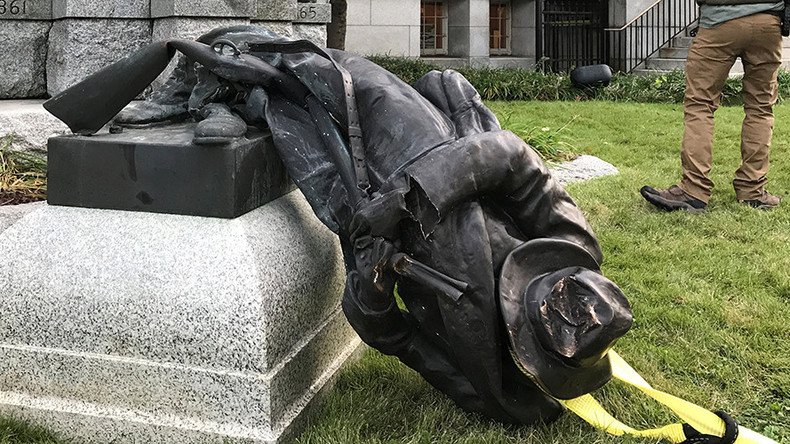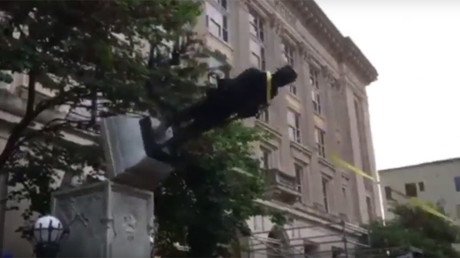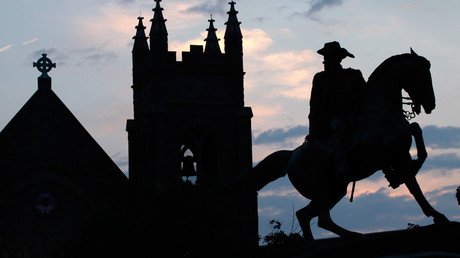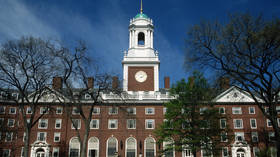Baltimore votes to rid itself of 4 Confederate statues

Baltimore City Council has voted to remove four Confederate monuments in the city. The move follows protesters pulling down a Confederate memorial in Durham, North Carolina after a deadly weekend of protests over another statue in Charlottesville, Virginia.
The council still has to decide whether to destroy the monuments or move them to a museum because of their historical significance.
“We still emphatically do not want these to be placed on public display anywhere,” council member Brandon Scott told WMAR.
Scott, who introduced the resolution calling for the destruction of the monuments said, “we should melt them down and use them to erect statues of true heroes of Baltimore.”
In 2016, a task force created by then-Baltimore Mayor Stephanie Rawlings-Blake reviewed four monuments linked to the Confederacy. Their 34-page report recommended the removal of two and adding contextual signage for the others, according to the Baltimore Sun.
Before leaving office, Rawlings-Blake had signs placed next to all the monuments stating they were “part of a propaganda campaign” to “perpetuate the beliefs of white supremacy.”
Current Baltimore Mayor Catherine Pugh has suggested the statues be removed and not destroyed. She told WMAR that the Maryland Historical Trust has to give permission to remove at least one of the statues.
Pugh said she had spoken to the mayor of New Orleans about the cost of monument removals. New Orleans spent $2.1 million. Pugh estimates the price tag will be lower in Baltimore and they could potentially be moved to the two or three Confederate cemeteries in Maryland.
The four monuments slated for removal are scattered across the city. There is the Confederate Soldiers and Sailors Monument at the gateway to Druid Hill Park, with a figure, Glory, holding up a dying Confederate soldier who’s holding the Confederate flag with the inscription “Gloria Victis” (glory to the vanquished).
The other is the Confederate Women’s Monument near John Hopkins University which also portrays a dying soldier with a tattered Confederate flag.
The third are the statues of Confederate Generals Robert E. Lee and Thomas “Stonewall” Jackson located near the Baltimore Art Museum. Depicted on horseback with an inscription that reads: “They were great generals and Christian soldiers and waged war like gentlemen.”
The fourth is the Roger Taney Monument at Mount Vernon Place. While there is no overt reference on the monument to the Confederacy, it was Taney who authored the Dred Scott decision, which ruled that Congress couldn’t regulate slavery and that blacks weren’t fully human.
Maryland was a slave state that bordered the North and South, and Baltimore was the site of the first casualties of the Civil War in April 1861.
Protests against Confederate monuments have been sweeping the US since the June 2015 mass shooting at the Mother Emanuel AME Church in Charleston, South Carolina. The shooter, who killed nine people and injured three more, said he wanted to “start a race war.”
South Carolina removed the Confederate flag memorial on the grounds of the state capitol in July that year. New Orleans in Louisiana has since removed several Confederate monuments over the objections of Confederate heritage organizations.
In one Florida town, petitioners want to replace a Confederate monument with a tribute to the local zoo’s beloved manatee.
Plans by authorities in Charlottesville to remove a Confederate statue from a city park drew protests from Confederate and alt-right activists who in turn attracted counter-protesters from Black Lives Matter and the so-called “Antifa” movement. In the ensuing clashes, a woman was killed when a car was driven into a crowd. Nineteen others were injured.
The US Army has meanwhile rejected calls from several members of Congress from New York to change the names of streets at Fort Hamilton in Brooklyn, which are named after Confederate generals.
















